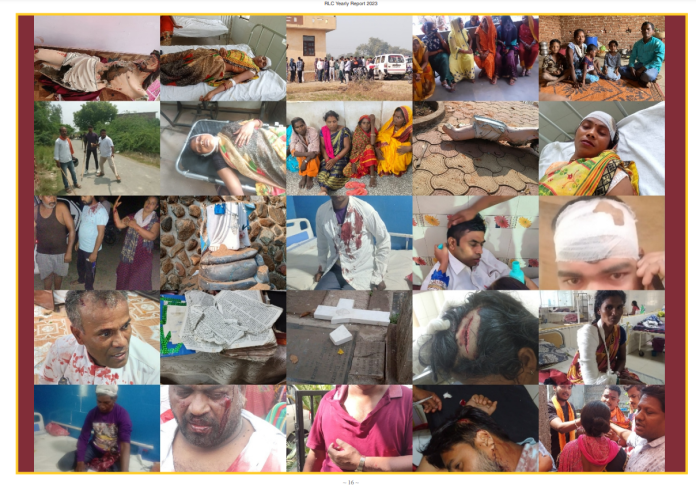‘Christians Faced Escalating Wave of Violence and Intolerance in 2023 too’
– Abdul Bari Masoud
New Delhi, March 28: Releasing its Religious Liberty Commission (EFIRLC) annual report on the persecution of Indian Christians, the Evangelical Fellowship of India (EFI) said a staggering 601 incidents of anti-Christian violence were recorded in 2023 last year, marking a steep and disturbing rise from previous years.
It urges all stakeholders to take note of the escalating violence against Christians in India and demands that constitutional rights be upheld for all citizens, irrespective of their religious or ethnic affiliations and calls for immediate government action. It also expresses grave concern over the enactment of Uniform Civil Code in BJP-ruled states.
The EFIRLC’s 112-page annual report documents an escalation in targeted violence, hate crimes, and systematic oppression faced by the Christian community across India in 2023.
“The rapidly deteriorating situation for religious minorities in India is a matter of grave concern,” said Rev. Vijayesh Lal, General Secretary of EFI. “The false narrative of forced conversions is being repeatedly exploited to justify horrific crimes of violence, intimidation, and harassment against the peaceful Christian community.”
The report highlights several regional hotspots where the Christian population faces immense adversity. Uttar Pradesh emerged as the most hostile environment, with 279 cases documented and an unprecedented 440 arrests of pastors and believers on baseless allegations of forcible conversions. Chhattisgarh witnessed 132 cases, while Haryana recorded 43 incidents.
The statistics merely scratch the surface, as countless incidents likely go unreported due to fear of reprisal or police apathy towards registering cases involving religious minorities. EFI emphasizes that vulnerable groups such as Dalit and Adivasi (tribal) Christians, as well as Christian women, face compounded discrimination and violence due to their intersectional identities.
“The Hindutva movement, a far-right political ideological faction, has been inaccurately accusing Christians of engaging in forced conversions,” Rev. Lal explained. “This unfounded claim has become a convenient pretext to unleash targeted aggression against our community.”
The report provides disturbing case studies that illustrate the brutality faced by Christians across India. In one instance, a 54-year-old pastor in Maharashtra was severely beaten with iron rods by masked assailants who accused him of conducting conversions during a prayer gathering. Another case details how a mob barged into a church in Rajasthan, locking the exit gates and physically assaulting 10 worshippers while accusing them of offering monetary incentives for conversions.
Perhaps most alarming is the account of a prayer meeting in Jharkhand where armed extremists disrupted the gathering, assaulted two women, and encouraged others to sexually assault them. Although the police initially resisted registering a complaint, an FIR was eventually filed after persistent efforts.
The unrest in Manipur echoes the tragic 2007-2008 pogrom in Kandhamal, Orissa, raising concerns about the state and central authorities’ commitment to restoring peace and order. While not specifically highlighted in the report, the victims primarily belong to Christian ethnic groups such as the Kuki, Zo, and Hmar tribes indigenous to the India-Myanmar border region.
Beyond physical violence, the report also highlights structural challenges facing religious minorities in India. Changes to the education system appear to undermine the constitutional rights of minorities regarding education, while the corporatization of the sector raises concerns about infiltration by extreme right-wing entities aligned with the current regime’s preferences.
Furthermore, the passage of a bill enforcing a Uniform Civil Code in Uttarakhand, with similar legislation proposed in Uttar Pradesh, Assam, and Chhattisgarh in 2024, threatens to erode legal protections and affirmative action measures afforded to religious minorities under the Indian constitution. Laws specifically targeting “missionary activity” could impede the constitutional right of Christians to freely profess, practice, and propagate their faith.
“As we approach general elections in 2024, it is imperative that the Indian government and relevant state administrations uphold the rule of law and ensure the safety and security of all religious minorities,” Rev. Lal urged. “We call for immediate and decisive action against organizations promoting communal violence and hatred, particularly in states like Uttar Pradesh, Chhattisgarh, Haryana, Karnataka, and Madhya Pradesh.”
EFI reiterates its commitment to fostering an inclusive and harmonious society based on secular principles enshrined in the Indian constitution.




